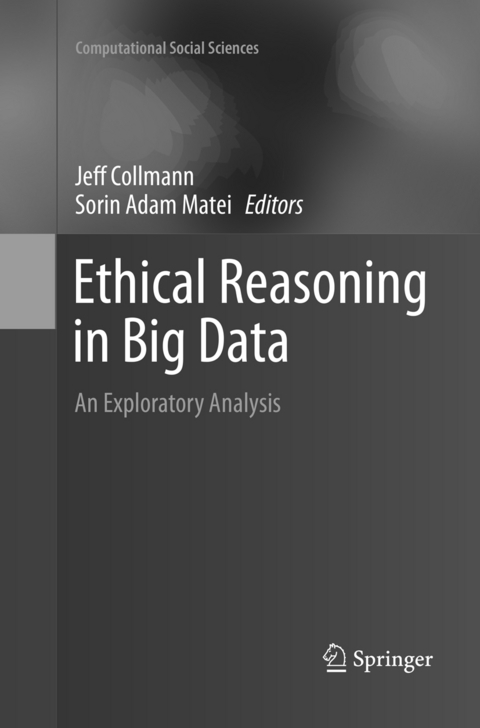
Ethical Reasoning in Big Data
Springer International Publishing (Verlag)
978-3-319-80351-7 (ISBN)
Sorin Adam Matei Purdue University 100 N. University Drive West Lafayette, IN 46077 Jeff Collmann Office of the Senior Vice President for Research Georgetown University 37th and O Streets, N.W. Washington, DC 20015
Part I. Applying a contextual analysis of privacy in Big Data research._A theoretical framework for ethical reflection in big data research.- Part II. Ethical reasoning beyond privacy in Big Data.- The Privacy Preferences of Americans.- Beyond TIA: government surveillance in the post-Snowden era.- Engaging the public in ethical reasoning about Big Data.- The Ethics of Large-Scale Genomic Research.- Neurotechnological Convergence and 'Big Data:A Force-Multiplier toward Advancing Neuroscience.- Assuring personal privacy on the Internet.- Part III. Institutionalizing ethical reasoning about Big Data.- Technology for Privacy Assurance.- Institutionalizing ethical reasoning: Integrating the ASA's Ethical Guidelines for Professional Practice into course, program, and curriculum.- Data Management Plans, Institutional Review Boards, and the Ethical Management of Big Data about Human Subjects.- Integrating ethical reasoning into preparation for participation to work in and with Big Data through the Stewardship model.
"Ethical reasoning in big data: an exploratory analysis is a timely book on the ethical aspects of big data. ... Big data analytics is a very important tool for future society. Used properly, it can benefit generations to come. Keep in mind that governments and corporations could also use it to invade people's privacy and well being. Therefore, everyone should keep an eye on big data development." (R. S. Chang, Computing Reviews, March, 2017)
"This book tries to analyze the meaning of privacy ... . It looks at specific domains, including the American public's attitudes; ways to build trust while analyzing large bodies of data; genomics research; and personal privacy on the internet. ... Summing Up: Recommended. All readers." (H. Levkowitz, Choice, Vol. 54 (6), February, 2017)
"Nearly 20 US-affiliated researchers contributed ten chapters to this collection, which originated at 'Privacy in the Infosphere: an NSF-Sponsored Workshop on Ethical Analysis of Big Data,' at GeorgetownUniversity. ... a variety of practitioners, researchers, and students will find this material of interest. ... big data is here and we must think about the ethical implications of how data is collected, stored, and utilized. This is the strength of this work." (Brad Reid, Computing Reviews, computingreviews.com, October, 2016)
| Erscheinungsdatum | 05.03.2022 |
|---|---|
| Reihe/Serie | Computational Social Sciences |
| Zusatzinfo | X, 192 p. 14 illus. in color. |
| Verlagsort | Cham |
| Sprache | englisch |
| Maße | 155 x 235 mm |
| Gewicht | 3168 g |
| Themenwelt | Informatik ► Datenbanken ► Data Warehouse / Data Mining |
| Schlagworte | Big data abuse • Big data education • Big data ethics • Commercialization of big data • Ethics and genomic research • Politics and big data • Privacy and big data • Privacy in analyzing social media • Socio-technical informatics |
| ISBN-10 | 3-319-80351-4 / 3319803514 |
| ISBN-13 | 978-3-319-80351-7 / 9783319803517 |
| Zustand | Neuware |
| Haben Sie eine Frage zum Produkt? |
aus dem Bereich


